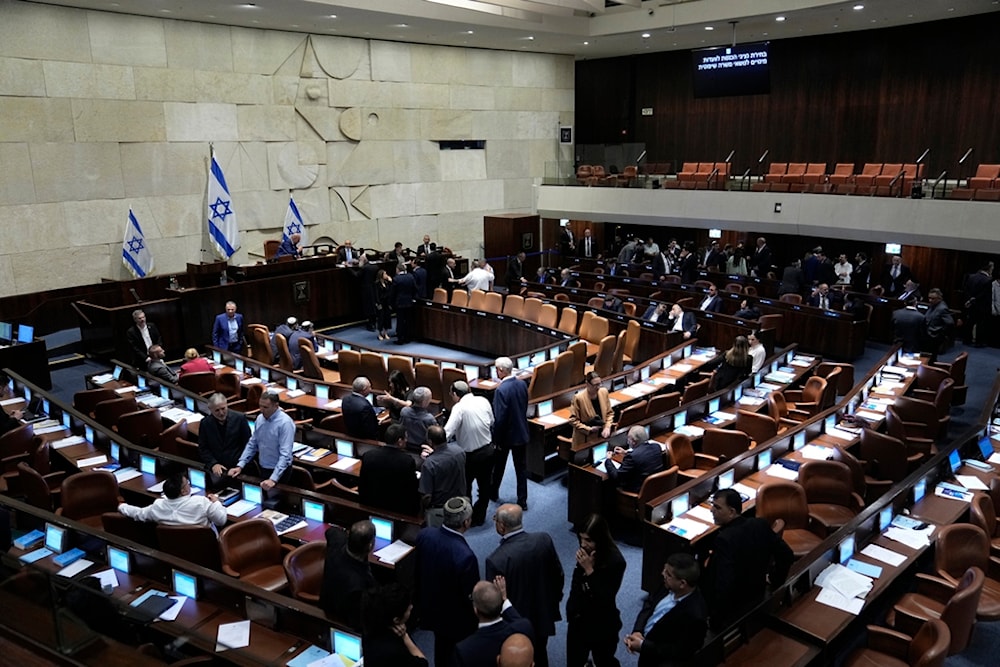Israeli Knesset approves resolution rejecting Palestinian statehood
Commenting on the vote, Israeli Prime Minister Benjamin Netanyahu stated that the vote sends a clear message to the international community regarding any attempt to unilaterally push for Palestinian sovereignty.
-

Israeli lawmakers are gathered for a vote at the Knesset, "Israel's" parliament, occupied Al-Quds, occupied Palestine, Wednesday, June 14, 2023 (AP Photo)
The Knesset passed a draft government resolution on Wednesday unilaterally rejecting the recognition of a Palestinian state by "Israel."
The resolution was passed with an overwhelming majority of votes, as 99 out of 120 Israeli lawmakers backed the legislation.
The motion was initially approved by the cabinet on Sunday and is now due to be enacted following its passage by the Knesset. On the day of its passing at the cabinet level, Israeli Prime Minister Benjamin Netanyahu explained that the resolution aims to reject so-called "international diktats" regarding a permanent settlement with the Palestinians. He further stated that if a settlement were to be reached, "it would come about solely through direct negotiations between the parties, without preconditions."
Read more: Bringing back Israeli captives not the top priority, Smotrich says
In response to today's vote, Netanyahu hailed the Knesset's overwhelming vote, adding that peace requires total victory over the Palestinian resistance and that direct negotiations be conducted without preconditions.
"In a clear message to the international community," Netanyahu said, "the Knesset voted overwhelming to oppose any attempt to unilaterally impose a Palestinian state on Israel. Such an attempt will only endanger Israel and will prevent the genuine peace that we all seek."
"Peace can only be achieved after we achieve total victory over Hamas and through direct negotiations between the parties without preconditions," he said. "I congratulate the members of the Knesset from the coalition and the opposition who voted in favor of my proposal against the establishment of a Palestinian state," he said.
The Israeli parliament's approval of the resolution was denounced by the Palestinian Foreign Ministry on Wednesday.
"By rejecting a Palestinian state and showing hostility to the world, they persistently seek to infringe on the rights of our people with their occupying forces, hold the Palestinian state hostage to their racist colonial interests," the ministry said in a statement.
The Knesset's decision is "an official attempt by Israel to defy the international community."
"The full membership of the State of Palestine in the United Nations and its recognition by many states do not require the permission of [Israeli Prime Minister Benjamin] Netanyahu," the statement read.
What now?
This issue raises an important setback for the US, which for the last four years, since the inception of the Abraham Accords, has been actively trying to push for normalization of diplomatic relations between Saudi Arabia and the Israeli regime.
Saudi Arabia has stated multiple times that the only obstacle standing in the way of a normalization deal is the establishment of a Palestinian State.
However, from the Israeli perspective, granting Palestine sovereignty would equate to "a prize to the Palestinians for what happened on Oct. 7," Netanyahu told US Secretary of State Antony Blinken earlier this month.
Read more: Saudi Ambassador urges ICJ to rule on illegality of Israeli occupation
To make matters worse, amid a surge in resistance operations across the region and a decline in "Israel's" global reputation, the regime has been deliberately escalating provocations in an attempt to drag the US into a regional war.
Not only have Resistance groups across the Middle East been targeting Israeli-linked elements in response to the genocide, but Cairo has also warned that it would be compelled to terminate "peace" agreements with the regime if the city of Rafah in Gaza were to be invaded.
Meanwhile, discussions are reportedly taking place regarding the potential withdrawal of US troops in both Iraq and Syria.
In case Netanyahu proceeds with his plan to invade Rafah, the US may decide to scale back on its decision to withdraw troops. The matter remains open to debate.

 4 Min Read
4 Min Read








